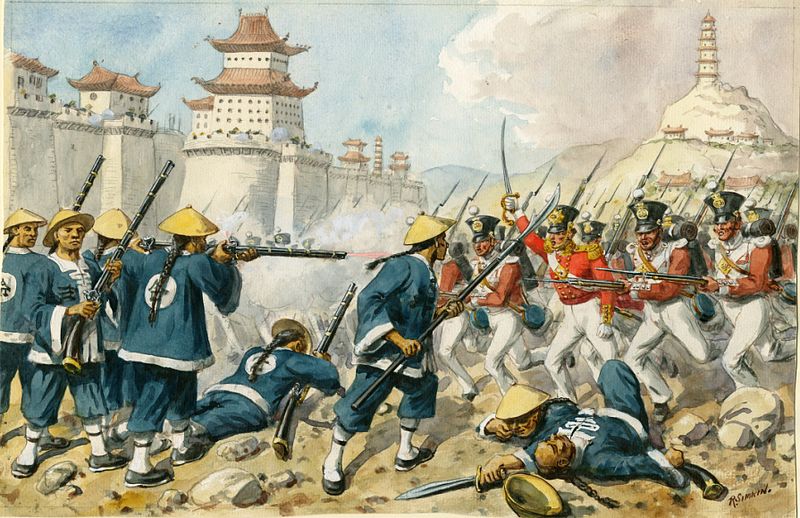At UnHerd, Bill Hayton looks at the one conflict between China and a western nation that bulks disproportionally large in the current Chinese government’s historical grievance-bank:

“The 98th Regiment of Foot at the attack on Chin-Kiang-Foo, 21 July 1842.”
Painting by Richard Simkin (1840-1926) via Wikimedia Commons.
Take three mid-19th century Asian conflicts: one killed 20 million people, one killed well over 100,000 and a third killed 20,000. Which one, despite being barely noticed by the Chinese government at the time, is the most discussed today and has become emblematic of an historic clash between East and West?
The immensely deadly Taiping Rebellion between 1850 and 1864 and the vicious conflict between “Hakka” and “Cantonese” peoples between 1855 and 1867 are barely known outside China, despite their far bloodier impacts on human lives. We know vastly more about the “First Opium War” of 1840 because it has played a totemic role in two political arenas: one in China and one in the UK. And in both places, the origins of the war have been obscured and distorted to suit political agendas.
In China, the “Opium War” marks the beginning of what the Communist Party currently calls the “century of national humiliation” — a period of unrelenting misery that only ended in 1949 with the Party’s victory in the Chinese Civil War. It is a narrative that underpins both the Party’s right to rule China and its increasingly assertive foreign policy. In Britain, the narrative of the war has been a weapon wielded variously by Liberal critics of a Whig government, puritan campaigners against drugs, leftist opponents of British foreign policy and Twitter-users claiming that white people are inherently racist. All these critiques and narratives caricature the evidence.
In the comic-book version, the British Empire went to war in 1840 to force an illegal and immoral drug, opium, down the respiratory passages of the Chinese people, purely for its own ill-gotten ends. This narrative is oddly patronising. It assumes that the Chinese side were merely naïve dupes, hapless victims to imperial power. It is time to recognise that there were several protagonists in the First Opium War.
On one side were the British free-traders, men who wanted an end to Chinese restrictions on commerce, whether of cotton or opium. There was also an East India Company anxious to maintain its good relations with local officials, and a London government and its critics with their own agendas. On the other was an imperial court in Beijing split between reformers and a clique of Chinese conservative “scholar-officials” intent on keeping foreign influence at bay. In the middle was an Asian financial problem triggered by a European war.



